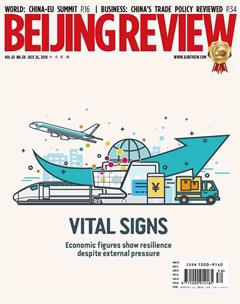Day of Celebration
Women of the Yao ethnic group present traditional clothing in Longji Township in Guilin, south Chinas Guangxi Zhuang Autonomous Region, on July 18, celebrating the Clothes Drying Festival. The annual event falls on the sixth day of the sixth month of the Chinese lunar calendar.
Online Copyright
A campaign against Internet platform copyright infringement was launched on July 16.
The campaign, jointly launched by the National Copyright Administration of China (NCAC), the Cyberspace Administration of China, the Ministry of Industry and Information Technology and the Ministry of Public Security, is to last for more than four months.
It will target key areas including the unauthorized republication of news as well as plagiarism on social media, unauthorized broadcasting of copyrighted content on short video sharing apps, and copyright violations by setting up overseas servers.
During the campaign, service providers will be pushed to enhance their internal copyright supervision systems, according to the NCAC.
Qinghai-Tibet Ecology
China issued a white paper on July 18 about ecological progress on the Qinghai-Tibet Plateau, a key eco-safety barrier in China and Asia, and a focus of the countrys drive to promote ecological progress.
A system for ecological conservation is undergoing improvement on the Qinghai-Tibet Plateau, with achievements having already been made in improving ecological conservation and environmental quality, said the white paper, published by the State Council Information Office and titled Ecological Progress on the Qinghai-Tibet Plateau.
Steady growth has been witnessed in local green industries with a system of technological support in place, and an eco-culture taking shape to showcase the Plateaus exemplary role in ecological development, it added.
Located in southwest China, the Qinghai-Tibet Plateau covers the entire Tibet Autonomous Region as well as Qinghai Province, and parts of Sichuan, Yunnan and Gansu provinces and the Xinjiang Uygur Autonomous Region.
It is around 2.6 million square km in area, mostly at an altitude of more than 4,000 meters above sea level.
Sometimes hailed the “roof of the world,” the “third pole” and the“water tower of Asia,” the plateau is home to many rare animals.
River Chiefs
The river chief scheme has been put in place nationwide amid efforts to combat water pollution, a senior official said on July 17. The deployment was six months ahead of schedule.
China started the scheme in December 2016, when the top leadership decided to assign each waterway in the country a specific steward, or river chief.
River chiefs are responsible for resource protection, pollution prevention and control, and ecological restoration. They will be held accountable for environmental damage in bodies of water under their supervision.
By the end of June, more than 1.06 million river chiefs had been appointed at various levels across the country, and six mechanisms had been set up to facilitate their work, Minister of Water Resources E Jingping said at a press conference.
Under the scheme, the country will push for the completion of rivers and lakes profiles and launch individual campaigns to tackle problems such as illegal sand mining, solid waste contamination, and water pollution, according to E.
Mental Health Education
The Ministry of Education has asked universities to offer a compulsory course on psychological health to all students in their first year.
The course should be allocated two credits and 32 to 36 class hours, according to a guideline published on the ministrys website on July 15.
It called for the development of online courses and the use of new media platforms in promoting knowledge of mental health.
There should be at least two qualified full-time psychologists at each higher education institution, according to the guideline, including private universities.
Besides training, it also requires universities to improve on-campus psychological counseling services and put in place a mechanism to protect students privacy.
In Full Bloom
The 19th China Kunming International Flower Show kicks off in southwest Chinas Yunnan Province on July 13, drawing the participation of more than 300 companies in the industry.
Illegal Publications
China confiscated more than 9.8 million illegal publications in the first half of 2018, according to the National Office for the Fight Against Pornography and Illegal Publications.
More than 24 million harmful, obscene, and pornographic items on the Internet were blocked, the office said.
Over 5,300 cases involving pornography and illegal publications were dealt with in the first half of the year, of which 88 major cases were jointly handled by the office and the Ministry of Public Security.
The office said it would continue to crack down on illegal publications, harmful and obscene information, fake media and copyright infringements to create a clean and safe cyberspace and publishing industry.
Anti-Tax Evasion
The State Administration of Taxation on July 13 ordered local authorities to reinforce tax payment and management for the film and television industry.
Companies and personnel in the sector should declare and pay taxes as required by law, the administration said in a statement.
Taxpayers in the industry should stick to the actual amount when issuing value-added tax invoices, and must not issue or let others issue invoices of a false amount, according to the statement.
Tax authorities will take back the tax rebate from taxpayers if the reduction they received is found to be against the rules, it added.
Local tax departments will improve tax source management in the film sector by coordinating with other government organs, helping taxpayers strengthen their financial system, and improving taxation management based on the different risk levels of companies and personnel.
The administration also asked for the stricter implementation of tax preference policies and measures to support the healthy development of the film sector through tax management and services, the statement said.
Rustic Delicacy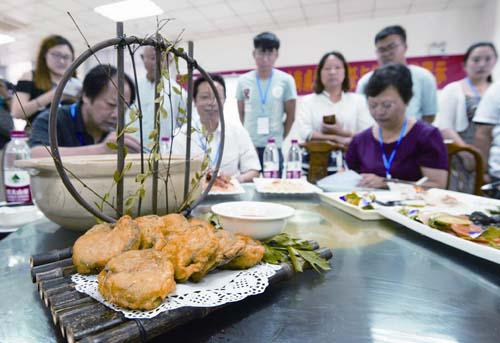
Judges taste dishes during a rural cooking contest in Haian, east Chinas Jiangsu Province, on July 17. Over 30 chefs took part in the culinary competition.
Alzheimers Drug
A Chinese research group on July 17 announced progress in developing a drug to treat Alzheimers disease.
GV-971 was developed by the Ocean University of China, Shanghai Institute of Materia Medica under the Chinese Academy of Sciences and Green Valley Pharmaceutical Co. Ltd., following a 21-year study.
A phase three clinical trial is the last test before going to market.
In the trial, participants took 450 mg GV-971 orally twice a day for 36 weeks, which proved effective in improving cognition.
Extracted from brown algae, the drug is targeted at patients with mild-to-moderate Alzheimers. Independent animal experiments also showed that it can regulate the immune system, reduce neuroinflammation and improve cognition.
Alzheimers disease is an irreversible, progressive brain disorder that slowly destroys memory, cognition, and the ability to carry out simple tasks. The disease affects about 48 million people worldwide, and the number is expected to increase with the aging of populations. There is no effective cure.
Mall Resurgence
The performance of Chinas shopping centers improved in 2017 amid fierce competition from online shopping platforms, a new index showed.
The China Shopping Center Development Index rose 1.3 points to 68.5 in 2017, showing market recovery and sound momentum in the sector, according to a report issued by the Ministry of Commerce.
A reading above 50 indicates expansion, while a reading below 50 shows contraction.
Thanks to their larger markets, first-tier cities saw higher development indexes than smaller cities.
More than 70 percent of business owners expressed optimism over the continued growth of rent, sales and profits, the report said, forecasting that the sound momentum of the sector will continue this year due to steady economic growth and the countrys consumption upgrading.
Stable Home Prices
House prices in major Chinese cities remained stable in June as local governments continued to curb the property sector, official data showed on July 17.
On a yearly basis, new residential house prices in four first-tier cities including Beijing and Shanghai remained unchanged from a year ago, the National Bureau of Statistics(NBS) said in a statement on its website.
The price growth of new homes in 31 second-tier cities expanded by 0.9 of a percentage point from that of May, while 35 third-tier cities remained the same, according to the NBS data based on a survey of 70 cities.
“Chinas home prices are relatively stable given the figures from 70 cities,” said NBS spokesperson Mao Shengyong said. “But structural problems still exist in the housing market.”
Mao said that third- and fourthtier cities have experienced price spikes since the beginning of this year, and some “hotspot” cities face challenges to tame the surge of property prices.
The government will continue to work on a property tax scheme and policies that allow tenants to enjoy the same rights as homeowners, Mao said. “A long-term mechanism will be developed to promote the steady and healthy development of the housing market.”
Social Perks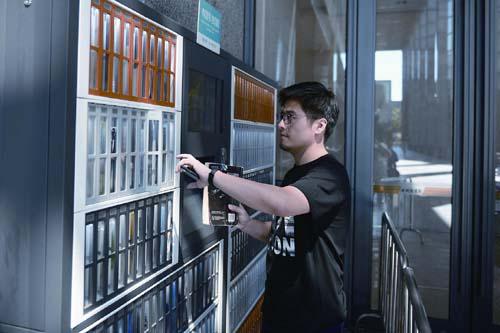
A man borrows a book, deposit-free, from a library in Hangzhou, capital of east Chinas Zhejiang Province, on July 18. The citys residents are now able to enjoy a number of services without paying a deposit if they have a good social credit score. The local government is working with the travel, transportation and accommodation sectors to enable those who study, work and travel in the city to avoid paying deposits.
Pinduoduo IPO
On July 17, e-commerce site Pinduoduo confirmed its sharefloating plan on NASDAQ, through which it seeks to raise up to $1.87 billion.
In its updated prospectus filed with the United States Securities and Exchange Commission, the social ecommerce company said two of its main existing shareholders, Tencent Holdings Ltd. and Sequoia Capital, have each indicated an interest in buying up to $250 million worth of shares in the IPO.
The company name was also changed from Walnut Street Group Holding Ltd. to Pinduoduo Inc., the same as its mobile app.
Boasting 344 million active users by the end of June, Pinduoduo allows customers to form a voluntary purchasing alliance through the use of social media—mostly Tencents WeChat—to enjoy discounts.
Northwest Railway Plan
Chinas top economic planner has approved a railway project linking the city of Yinchuan with Shizuishan City in northwest Chinas Ningxia Hui Autonomous Region, with a total investment of 12.87 billion yuan ($1.9 billion).
Spanning 100.6 km, the high-speed railway will have four stops and a top-speed of 250 km/h, according to the National Development and Reform Commission.
The project, which will take four years to complete, is expected to increase development and boost the local economy, the commission said.
China spent 801 billion yuan($119 billion) on railway projects and put 3,038 km of new tracks into operation in 2017, exceeding its annual targets of 800 billion yuan ($119 billion) in investment and 2,100 km in new lines, according to the China Railway Corp.
Tomato Harvest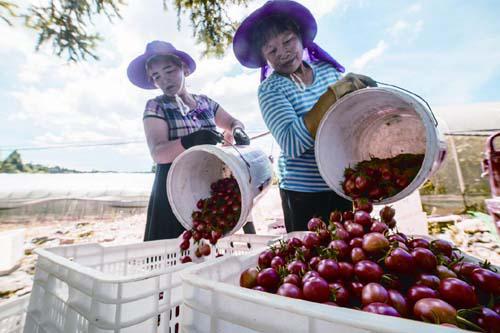
Farmers harvest cherry tomatoes on July 18 in a village of Dafang County in southwest Chinas Guizhou Province. Locally grown cherry tomatoes are sold mainly to customers from Guangdong Province and Guangxi Zhuang Autonomous Region.
New Energy Power
China reported faster growth in new energy power generation in June, official data showed on July 17.
“The growth of electricity generated by new energy accelerated markedly, while thermal and hydro power saw slower growth,” said Yan Pengcheng, spokesperson for the National Development and Reform Commission (NDRC), at a press conference.
In June, nuclear power generation increased 19.3 percent year on year, compared with 15.1 percent in May, according to NDRC data.
Electricity generated by wind and solar rose 11.4 percent and 21.1 percent, respectively, compared with 6.7 percent and 14.8 percent in May.
Thermal and hydro power output climbed 6.3 percent and 3.7 percent, respectively, down by 4 percentage points and 3.2 percentage points from May, Yan told reporters.
China is promoting new energy to cope with pollution and boost the quality of growth.
In the first half of the year, power generation increased 8.3 percent year on year, slower than the 8.5-percent growth registered in the first five months.
Aircraft Maintenance Service
Chinas Xiamen Airlines becomes the countrys first carrier to sign for the Boeing Co.s advanced aircraft maintenance service, Boeing announced on July 17.
Xiamen Airlines, the fifth largest carrier in China, placed the order for the Boeing Optimized Maintenance Program (OMP) during the ongoing 2018 Farnborough International Airshow in England.
The OMP, powered by the AnalytX technology produced by the U.S. aircraft manufacturer, uses analytics to evaluate and analyze an airlines maintenance program and improves the operators maintenance experience through improved maintenance recommendations.
Boeing said that the program can cut scheduled maintenance labor and material costs by more than 20 percent and the associated ground time by more than 30 percent on average while improving fleet on time performance and inservice maintenance activities.
“We are pleased to be the first in the country to utilize OMPs ability to use data to tailor a maintenance program specific to our needs,” said Zhao Dong, President and CEO of Xiamen Airlines.
Ihssane Mounir, Senior Vice President of Commercial Sales and Marketing at Boeing, said that the OMP will offer innovative data analytics capabilities to anticipate Xiamen Airlines needs and help it drive down maintenance costs.
Finetuning Success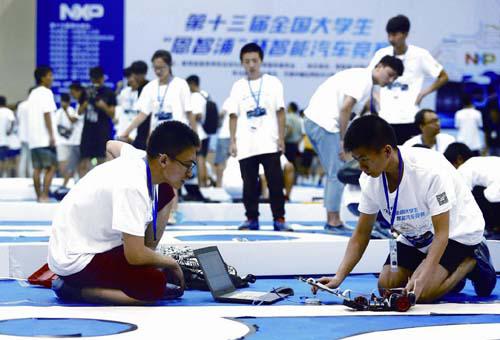
Contestants tweak their cars during the north China leg of the 13th National College Students Intelligent Vehicle Competition in Tianjin on July 18. The competition was held from July 18 to 19 at the Tianjin Sino-German University of Applied Sciences.
Global Innovation Index
China is the only middle-income economy on the Global Innovation Index 2018s list of the worlds 20 most innovative economies.
The annual ranking, released on July 10, also showed China has the second-largest number of science and technology clusters and is making rapid progress in clean energy technologies.
China climbed to 17 in the rankings from 22 last year.
“The case fits into a trend weve seen for several years now of China rising in the rankings,” said Francis Gurry, Director General of the World Intellectual Property Organization(WIPO), at the launch of the index.
Explaining the leap, he said Chinas economy is transforming from being labor intensive toward a focus on high-value added, with innovation a central element of this structural transformation driven by a top-down strategy.
The Global Innovation Index ranks 126 economies based on 80 indicators, ranging from intellectual property filing rates to mobileapplication creation.
The index is co-published by WIPO, Cornell University and INSEAD, a leading international business school.

